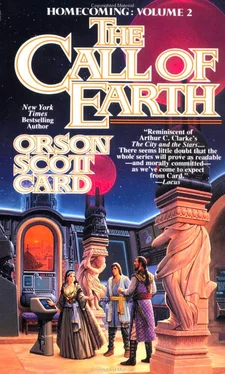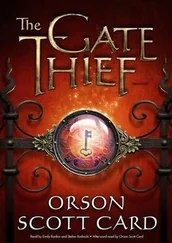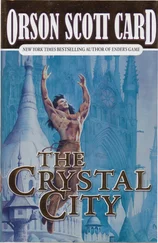Orson Card - The Call of Earth
Здесь есть возможность читать онлайн «Orson Card - The Call of Earth» весь текст электронной книги совершенно бесплатно (целиком полную версию без сокращений). В некоторых случаях можно слушать аудио, скачать через торрент в формате fb2 и присутствует краткое содержание. Жанр: Фантастика и фэнтези, на английском языке. Описание произведения, (предисловие) а так же отзывы посетителей доступны на портале библиотеки ЛибКат.
- Название:The Call of Earth
- Автор:
- Жанр:
- Год:неизвестен
- ISBN:нет данных
- Рейтинг книги:3 / 5. Голосов: 1
-
Избранное:Добавить в избранное
- Отзывы:
-
Ваша оценка:
- 60
- 1
- 2
- 3
- 4
- 5
The Call of Earth: краткое содержание, описание и аннотация
Предлагаем к чтению аннотацию, описание, краткое содержание или предисловие (зависит от того, что написал сам автор книги «The Call of Earth»). Если вы не нашли необходимую информацию о книге — напишите в комментариях, мы постараемся отыскать её.
The Call of Earth — читать онлайн бесплатно полную книгу (весь текст) целиком
Ниже представлен текст книги, разбитый по страницам. Система сохранения места последней прочитанной страницы, позволяет с удобством читать онлайн бесплатно книгу «The Call of Earth», без необходимости каждый раз заново искать на чём Вы остановились. Поставьте закладку, и сможете в любой момент перейти на страницу, на которой закончили чтение.
Интервал:
Закладка:
"Nafai is so impetuous," said Eiadh. "Aren't you proud of him?"
Couldn't she stop talking about him? Until this morning, Elemak had known that Eiadh was the finest marriage a man could make for himself in this city. But now he realized that in the back of his mind he had really been thinking that she was the finest first marriage a young man could make. Someday he would need a real wife, a consort, and there was no reason to think that Eiadh would grow up into such a one. She would probably always be shallow and frivolous, the very thing that he had found so endearing. Last night when she had sung to him, her throaty voice full of rehearsed passion, he had thought he could listen to her sing forever. Now he looked at the platform and realized that it was Nafai, after all, who had made a marriage that would be worth having thirty years from now.
Well, fine, thought Elemak. Since we won't get away from Basilica, I'll keep Eiadh for a couple of years and then gently ease her away. Who knows? Luet may not stay with Nafai. When she gets older she may begin to wish for a strong man beside her. We can look back on these first marriages as childish phases we went through in our youth. Then I will be the brother-in-law of the consul.
As for Eiadh, well, with luck she'll bear me a son before we're through. But would that truly be luck? Should my eldest son, my heir, be a boy with such a shallow woman for his mother? In all likelihood, it will be the sons of my later marriages, my mature marriages, who will be the worthiest to take my place.
Then, like a sudden attack of indigestion, there came the realization that Father, too, might feel that way. After all, Lady Rasa was his marriage of maturity, and Issib and Nafai the sons of that marriage. Wasn't Mebbekew walking, talking proof of the unfortunate results of early marriages?
But not me, thought Elemak. I was not the son of some frivolous early marriage. I was a son he couldn't have dared to ask for-his Auntie's son, Hosni's son, born only because she so admired the boy Volemak as she introduced him to the pleasures of the bed. Hosni was a woman of substance, and Father trusts and admires me above his other children. Or did, anyway, until he started having visions from the Oversold and Nafai was able to parlay that into an advantage by pretending to have visions, too.
Elemak was filled with rage-old, deep-burning rage and hot new jealousy because of Eiadh's admiration for Nafai. Yet what burned hottest and deepest was his fear that Nafai was not pretending, that for some unknowable reason the Oversoul had chosen Father's youngest instead of his eldest to be his true heir. When Issib's chair was taken over by the Oversoul and stopped Elemak from beating Nafai in that ravine outside the city, hadn't the Oversoul as much as said so? That Nafai would one day lead his brothers, or something to that effect?
Well, dear Oversoul, not if Nafai is dead. Ever think of that? If you can speak to him then you can speak to me, and it's about time you started.
I gave you the dream of wives.
The sentence came into Elemak's mind as clearly as speech. Elemak laughed.
"What are you laughing at, Elya, dear?" asked Eiadh.
"At how easily a person can deceive himself," said Elemak.
"People always talk about how a person can lie to himself, but I've never understood that," said Eiadh. "If you tell yourself a lie, then you know you're lying, don't you?"
"Yes," said Elemak. "You know you're lying, and you know what the truth is. But some people fall in love with the lie and let go of the truth completely."
As you're doing now, said the voice in his head. You prefer to believe the lie that I cannot speak to you or anyone else, and so you will deny me.
"Kiss me," said Elemak.
"We're in the middle of the Orchestra, Elya!" she said, but he knew she wanted to.
"All the better," he said. "We were married last night-people expect us to be oblivious to everything but each other."
So she kissed him, and he let himself fall into the kiss, blanking his mind to everything but desire. When at last the kiss ended, there was a smattering of applause-they had been noticed, and Eiadh was delighted.
Of course, Mebbekew immediately proposed an identical kiss to Dol, who had the good sense to decline. Still, Mebbekew persisted, until Elemak leaned across Eiadh and said, "Meb. Anticlimax is always bad theatre-didn't you tell me that yourself?"
Meb glowered and dropped the idea.
I am still in control of things, Elemak thought. And I am not about to start believing voices that pop into my mind just because I wish for them. I'm not like Father and Nafai and Issib, determined to believe in a fantasy because it feels so warm and cuddly to think that some superior being is in charge of things. I can deal with the cold hard truth. That's always enough for a real man.
The horns began. From all the minarets around the amphitheatre, the horners began their wailing cries. These were ancient instruments, not the finely-tuned horns of theatre or concert, and there was no attempt to create harmony between them. Each horn produced one note at a time, held long and loud, then fading as the horner lost breath. The notes overlaid each other, sometimes with winsome dissonance, sometimes with astonishing harmonies; always it was a haunting, beautiful sound.
It silenced the citizens gathered in the benches, and it filled Elemak with a trembling anticipation, as he knew it did with every other person in the Orchestra. The wedding was about to begin.
Thirsty stood at the gate of Basilica and wondered why the Oversoul had failed her now. Hadn't she been helped every step of the way from Potokgavan? She had come upon a canal boat and asked them to let her ride, and they had taken her aboard without question, though she could give them no fare. At the great port, she had boldly told the captain of the corsair that the Oversoul required her to have the fastest passage to Redcoast ever achieved, and he had laughed and boasted that as long as he took no cargo, he could make it in a day, with such a fair wind. In Redcoast a fine lady had dismounted from her horse and offered it to Thirsty on the street.
It was on that horse that Thirsty arrived at the Low Gate, expecting to be admitted easily, as all women always were, citizens or not. Instead she found the gate tended by Gorayni soldiers, and they were turning everyone away.
"There's a great wedding going on inside," a soldier explained to her. "General Moozh is marrying some Basilican lady."
Without knowing how, Thirsty knew at once that this wedding was the reason she had come.
"Then you must let me in," she said, "because I am an invited guest."
"Only the citizens of Basilica are invited to attend, and only those who were already inside the walls. Our orders allow no exceptions, not even for nursing mothers whose babes are inside the walls, not even for physicians whose dying patients are within."
"I am invited by the Oversoul," said Thirsty, "and by that authority I revoke any orders you were given by a mortal man."
The soldier laughed, but only a little, for her voice had carried, and the crowd at the gate was watching, listening. They had also been turned away, and were liable to turn surly at the slightest provocation.
"Let her in," said one of the soldiers, "if only to keep the crowd from turning."
"Don't be a fool," said another. "If we let her in we'll have to let them all in."
"They all want me to enter," said Thirsty.
The crowd murmured their assent. Thirsty wondered at this-that the crowd of Basilicans should heed the Oversoul so readily, while the Gorayni soldiers were deaf to her influence. Perhaps this was why the Gorayni were such an evil race, as she had heard in Potokgavan: because they could not hear the voice of the Oversoul.
Читать дальшеИнтервал:
Закладка:
Похожие книги на «The Call of Earth»
Представляем Вашему вниманию похожие книги на «The Call of Earth» списком для выбора. Мы отобрали схожую по названию и смыслу литературу в надежде предоставить читателям больше вариантов отыскать новые, интересные, ещё непрочитанные произведения.
Обсуждение, отзывы о книге «The Call of Earth» и просто собственные мнения читателей. Оставьте ваши комментарии, напишите, что Вы думаете о произведении, его смысле или главных героях. Укажите что конкретно понравилось, а что нет, и почему Вы так считаете.









